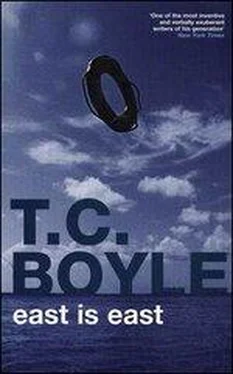Tom Boyle - East is East
Здесь есть возможность читать онлайн «Tom Boyle - East is East» весь текст электронной книги совершенно бесплатно (целиком полную версию без сокращений). В некоторых случаях можно слушать аудио, скачать через торрент в формате fb2 и присутствует краткое содержание. Жанр: Современная проза, на английском языке. Описание произведения, (предисловие) а так же отзывы посетителей доступны на портале библиотеки ЛибКат.
- Название:East is East
- Автор:
- Жанр:
- Год:неизвестен
- ISBN:нет данных
- Рейтинг книги:5 / 5. Голосов: 1
-
Избранное:Добавить в избранное
- Отзывы:
-
Ваша оценка:
- 100
- 1
- 2
- 3
- 4
- 5
East is East: краткое содержание, описание и аннотация
Предлагаем к чтению аннотацию, описание, краткое содержание или предисловие (зависит от того, что написал сам автор книги «East is East»). Если вы не нашли необходимую информацию о книге — напишите в комментариях, мы постараемся отыскать её.
, praised by
in
as "one of the most exciting young fiction writers in America," the result is a sexy, hilarious tragicomedy of thwarted expectations and mistaken identity, love, jealousy, and betrayal.
East is East — читать онлайн бесплатно полную книгу (весь текст) целиком
Ниже представлен текст книги, разбитый по страницам. Система сохранения места последней прочитанной страницы, позволяет с удобством читать онлайн бесплатно книгу «East is East», без необходимости каждый раз заново искать на чём Вы остановились. Поставьте закладку, и сможете в любой момент перейти на страницу, на которой закончили чтение.
Интервал:
Закладка:
But now, now she had a headache and she was hungover and Owen’s wake-up call had taken her by surprise. The morning was stifling, a blanket thrown over her face, and it was August already, the first week nearly gone, and there’d been no sign of Hiro for three days now. She forced herself to get up. She had work to do—she’d never worked so well in her life—and she was anxious to get down to breakfast, reign over the table and clear her head with lukewarm coffee and scalding gossip.
She ran a brush through her hair and pulled it back in a ponytail, made up her eyes and brushed her teeth, then slipped into a pair of shorts and a halter top, no brassiere, and dug her white cork-heeled canvas sandals out from under the bed. As she passed through the silent room, Laura Grobian looked up from her soft-boiled egg and acknowledged her with a dip of the head and a blink of the famous haunted eyes, and Ruth felt a quick little surge of triumph. Then it was through the oak doors and on into the convivial room, where she was greeted by laughter, cigarette smoke and shouts of “La Dershowitz!” and “Up so soon?” and “She’s feeling it now!”
Bob, Sandy, Irving Thalamus, Ina Soderbord and half a dozen others were gathered at the long dark table, a rubble of thrice-read newspapers, books, manuscripts, egg-stained plates, mugs and ashtrays scattered about them. The big silver rocket of a coffee pot sat on the sideboard, along with a serving pan of waffles and a bowl of fruit compote. Rico was in the kitchen, making toast, eggs and Canadian bacon to order. Ruth ducked her head through the swinging door to the kitchen and caught him flipping an omelet behind his back. “Pretty fancy,” she said, tailing it with a low whistle.
Rico gave her a gold-capped smile. He was twenty-two, six inches shorter than any man ought reasonably to be, and his big black circular eyes devoured his face in sadness. “No sweat,” he said.
“Could you make me a poached egg when you get a chance?” she asked, leaning in and balancing on one leg. The kitchen smelled rich and potent. “And maybe some dry wheat toast, two slices?”
“No sweat,” Rico said, and he flipped the omelet again, just to show off.
Ruth poured herself a cup of coffee, laced it with Sweet’n Low and hovered over the table till Irving Thalamus cleared a spot for her. “Sleep tight?” he said, giving her a lascivious look as she sat down beside him and crossed her legs. His eyes were hooded, the lids puckered and dark. He looked as if he should be wearing a burnoose and sandals, counting camels and harem girls somewhere out in the Negev.
Ruth gave him a rueful smile. “Too much booze,” she said, “but Sax and I took a little stroll after we left you.” She paused. “That revived me, all right. And I slept like a stone.”
He dropped his eyes and began to fiddle with his fork, building a little pyramid of scrambled egg in the center of his plate. The card from his son—a freshman at Yale—had been bitter stuff. The son was planning to spend the holidays with the estranged wife in Mount Kisco; Irving Thalamus had apparently written to offer him a room in the house he was renting on Key West. The son had written back to say no, unequivocally, and to add that he considered his father a hypocrite, a narcissistic overpraised hack and a moral dwarf who couldn’t keep the patriarchal penis in his pants. The letter from the agent was worse. So bad Ruth had experienced a momentary pang of guilt while reading it—but it was only momentary, because, after all, she was an artist, an intellectual, and she made her own rules. The agent—one of the most venerable in New York—had written to say that Irving Thalamus’s publisher, the publisher who’d done his last six books, was advising him against coming out with the new novel. Dog Days was an embarrassment. Misguided. Incoherent. The publisher—and the agent concurred, gently and at length—knew that he would see the light. In six months’ time, with a little distance, he’d repudiate the work himself. He would. And he had his career to think about now, his future in the pantheon of American letters, and why spoil it with an ill-considered move at this juncture? The agent signed off by trusting that the rest cure in the bucolic atmosphere of Thanatopsis House was doing him a world of good.
“So how’s your new story coming?” he said, swinging his hard jaw back to her.
She knew he didn’t want to hear the truth, knew that the only answer to that question was to grumble, denigrate herself, whine about the blank page and how useless she was and wonder, awe in her eyes, how he managed to produce one astonishing book after another. She took another sip of coffee, set her mug down and leaned in close to him. “I’ve never worked better in my life,” she said.
“Hey, terrific,” he said, “that’s great, it really is.” His eyes looked wounded.
Bob shouted something about poker that night and then rose to leave the table. Ina Soderbord, wearing a pink sweat suit though it must have been ninety already, got up to leave with him and Ruth raised her eyebrows. Irving Thalamus nodded in affirmation. Then Rico cha-cha’d out of the kitchen, a muted blast of salsa music coming with him, and set down Ruth’s plate of egg and toast. She took a moment to upend the egg on the toast and dose it with salt and pepper before she turned back to Thalamus and asked the question that had, by all rules of writerly etiquette, to follow from his: “And how about you? Dog Days going well?”
He gave her a strange look, the look of a man who’s had his shorts stolen and his mail rifled. But no, how could he know? He’d talked about nothing but Dog Days since she’d got here—she wasn’t giving anything away. “Oh, that,” he said, shrugging. “Fine. Okay.” He paused. “I’m on to something new now anyway, something totally different for me, a real departure. I’m excited about it.” He didn’t look excited. Or he looked about as excited as a middle-aged legend contemplating moving his bowels in the communal bathroom, which is exactly what he was.
She was going to say something banal, like “I’m really happy for you” or “It’s the least we can expect from you, Irving,” but he turned to her suddenly and his face lit up. “Hey,” he said, “you hear the news?”
She hadn’t. She pursed her mouth and folded her hands in her lap. She was expecting something juicy, something to chew over and digest and laugh about till lunch, the thrilling little kernel of gossip that would make her whole billiard-room routine for the next week. The last thing he’d given her—and it was too much, she couldn’t have invented anything better—was the news that Peter Anserine had climbed the stairs to his room one night only to find Clara Kleinschmidt, lumps and all, reclining across his bed like the naked Maja—and the best part of it was, she didn’t leave till the morning. “No,” Ruth said, arching her back and darting a quick glance round the room, “tell me.”
“I can’t believe it,” he said. “Guess who’s coming—for a six-weeks’ residency?”
She couldn’t guess.
Plates rattled in the kitchen, Bob took Ina’s hand and sauntered out the door, Sandy yawned, stretched and stood up. Irving Thalamus leaned toward her, his eyes bright, his grin as sharp as a watchdog’s. “Jane Shine,” he said. “Jane Shine’s coming. Can you believe it?
Fea Purē
I want to help you, she whispered as he stood there in the doorway, the lunch bucket clutched in his hand. They all wanted to help him. That’s why they blasted their shotguns at him and hunted him with their dogs, that’s why they played Donna Summer in the swamps and tried to run him down in their speedboats. It was this one’s lover, her bōifurendo, the beef-eater and butter-stinker, naked and hairy and with his big dog’s prick hanging down like a sausage, who’d run the boat at him when he was half drowned and chased him out of the store when he was starving. He’d wanted to help too.
Читать дальшеИнтервал:
Закладка:
Похожие книги на «East is East»
Представляем Вашему вниманию похожие книги на «East is East» списком для выбора. Мы отобрали схожую по названию и смыслу литературу в надежде предоставить читателям больше вариантов отыскать новые, интересные, ещё непрочитанные произведения.
Обсуждение, отзывы о книге «East is East» и просто собственные мнения читателей. Оставьте ваши комментарии, напишите, что Вы думаете о произведении, его смысле или главных героях. Укажите что конкретно понравилось, а что нет, и почему Вы так считаете.











